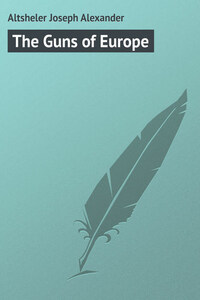"The Guns of Europe" is the first of three connected romances, of which "The Forest of Swords" and "The Hosts of the Air" are to be respectively the second and third, dealing with the world war in Europe.
It was the singular fortune of the author to be present at the beginning of this, the most gigantic struggle in the history of our globe. He was in Vienna the day Austria-Hungary declared war upon Servia, thus setting the torch that lighted the general conflagration. Returning westward, he reached Munich the day Germany declared war upon Russia. He remained in Germany nearly a month, having witnessed in turn the Austrian and German mobilizations, and then arrived in England in time to see the gathering of the British Empire's armed hosts.
He was also, upon his return, in Quebec when the greatest colony of the British was rallying to their support. Such an experience at such an extraordinary crisis makes ineffaceable impressions, and through his characters, the author has striven his best to reproduce them in these three romances.
CHAPTER I
THE SISTINE MADONNA
John turned a little to the left, going nearer to the window, where he could gain a better view of the Madonna, which he had heard so often was the most famous picture in the world. He was no technical judge of painting – he was far too young for such knowledge – but he always considered the effect of the whole upon himself, and he was satisfied with that method, feeling perhaps that he gained more from it than if he had been able to tear the master-work to pieces, merely in order to see how Raphael had made it.
"Note well, John, that this is the Sistine Madonna," began William Anson in his didactic, tutorial tone. "Observe the wonderful expression upon the face of the Holy Mother. Look now at the cherubs gazing up into the blue vault, in which the Madonna like an angel is poised. Behold the sublime artist's mastery of every detail. There are those who hold that the Madonna della Sedia at Florence is its equal in beauty and greatness, but I do not agree with them. To me the Sistine Madonna is always first. Centuries ago, even, its full worth was appreciated. It brought a great price at – "
The rest of his speech trailed off into nothingness. John had impatiently moved further away, and had deliberately closed his ear also to any dying sounds of oratory that might reach him. He had his own method of seeing the wonders of the Old World. He was interested or he was not. It was to him a state of mind, atmospheric in a way. He liked to breathe it in, and the rattle of a guide or tutor's lecture nearly always broke the spell.
Anxious that Mr. Anson should not have any further chance to mar his pleasure he moved yet closer to the great window from which came nearly all the light that fell upon the Sistine Madonna. There he stood almost in the center of the beams and gazed upon the illumined face, which spoke only of peace upon earth and good will. He was moved deeply, although there was no sign of it in his quiet eyes. He did not object to emotion and to its vivid expression in others, but his shy nature, feeling the need of a defensive armor, rejected it for himself.
It was a brighter day than the changeful climate of Dresden and the valley of the Elbe usually offered. The sunshine came in a great golden bar through the window and glowed over the wonderful painting which had stood the test of time and the critics. He had liked the good, gray city sitting beside its fine river. It had seemed friendly and kind to him, having in it the quality of home, something almost American in its simplicity and lack of caste.
They had arrived as soon as the doors were opened, and but few people were yet in the room. John came from his mood of exaltation and glanced at the others, every one in turn. Two women, evidently teachers, stood squarely in front of the picture and looked alternately at the Madonna and one of the red volumes that mark the advance of the American hosts in Europe. A man with a thick, black beard, evidently a Russian, moved incessantly back and forth, his feet keeping up a light shuffle on the floor. John wondered why some northern races should be so emotional and others so reserved. He had ceased to think that climate ruled expression.
A stout German frau stood gazing in apparent stolidity. Yet she was not so stolid as she seemed, because John caught a beam of appreciation in her eye. Presently she turned and went out, doubtless returning to some task of the thrifty housewife in this very city of Dresden. John thought her emblematic of Germany, homely herself, but with the undying love of the beautiful shown so freely in her fine cities, and in the parks, gardens and fountains more numerous than in an other country.
Her place was taken by an officer in a uniform, subdued in color, but martial. He was a tall, stiff man, and as he walked with a tread akin to the goosestep his feet clanked upon the floor. He wore a helmet, the cloth cover over the spike, but John noticed that he did not take off the helmet in the presence of the Sistine Madonna. He moved to a place in front of the picture, brushing against the sisterhood of the red book, and making no apology. There he stood, indifferent to those about him, holding himself as one superior, dominant by force, the lord by right of rank over inferior beings.











